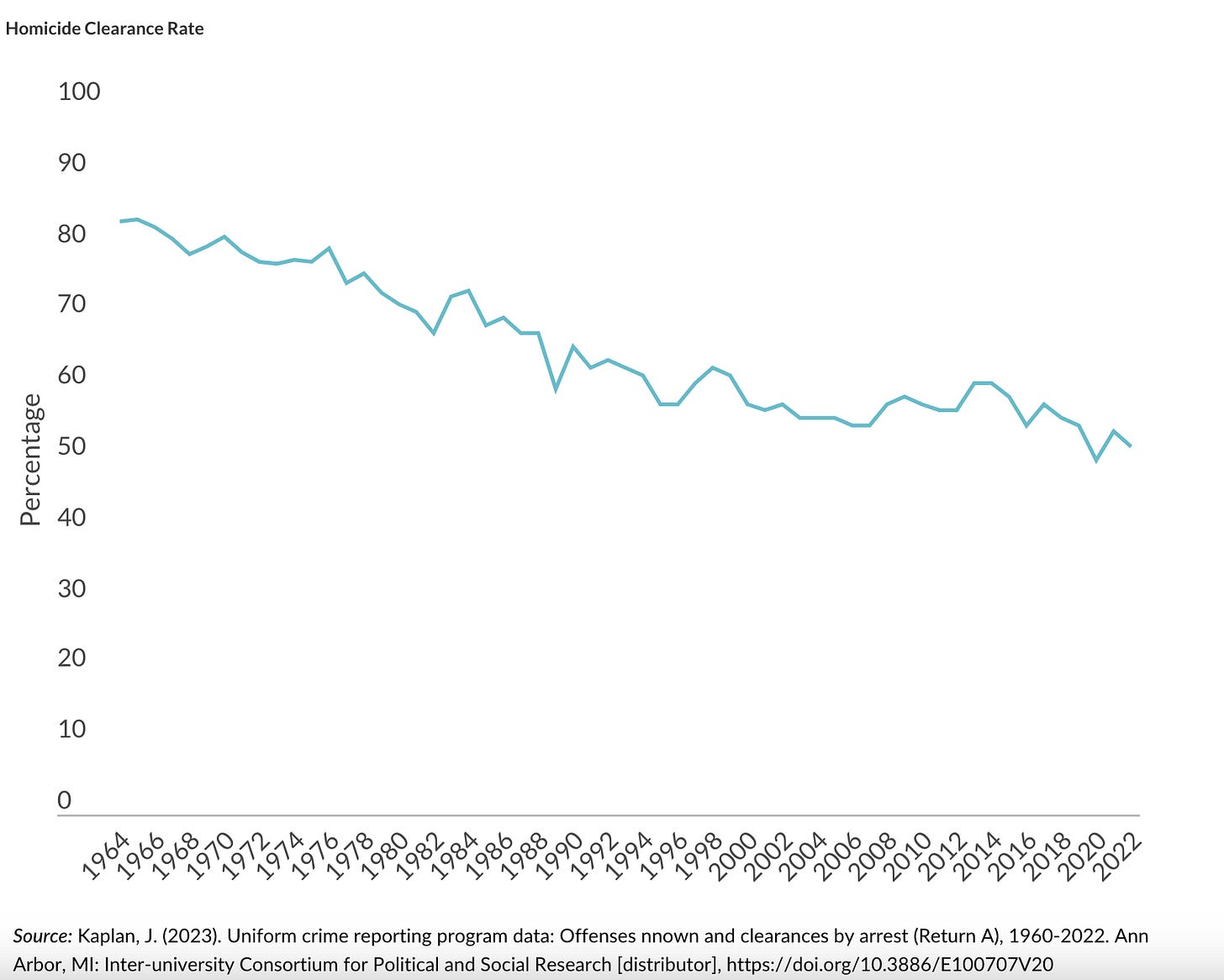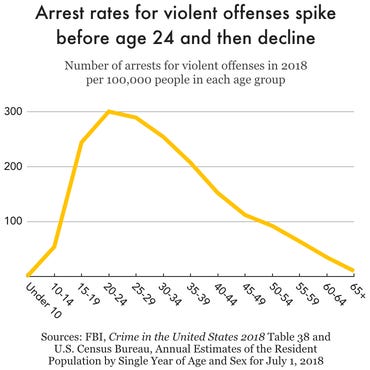Acceptance of crime is a policy choice
Stopping crime has never been easier, but we do less of it
Technology can upend society. In the last 20 years, doorbell cameras and cameras around the home have become ubiquitous. More recently, Apple AirTags have given people the ability to easily track lost or stolen items. It’s never been easier for individuals to deter crime and catch petty criminals.
Of course this technology has been available to police for much longer. However, we don’t catch many criminals.
In fact, we’ve gotten worse at it over time. Consider the homicide clearance rate. It was around 80% in the 1960s. Today it’s more or less a coin-flip.
Maybe the nature of homicide has changed from the 1960s, and there are fewer homicides that are easy to catch. Let’s look at motor vehicle thefts. Surely with millions of police cameras and technology enabled cars we’re better at catching car thieves.
If you’re interest in car thefts, check out the Channel 5 video on Kia Boys. The short version is its a bunch of underage kids that steal cars, trash them and either ditch them or sell them (for usually less than $100) to be used to commit other crimes. Currently the most popular solution is to blame Kia for making their cars so easy to steal, rather than arresting and prosecuting the dozen or so kids stealing cars.
How about property crimes?
Any one of these I would be willing to explain as noise or changing nature of crime, but everywhere you look you’ll see less effective policing. And this is with higher police budgets and more sophisticated technology.
But official statistics tell only part of the story. How about “lived experience”? Most people in large cities, myself included, have had some frustrating experience with policing.
For instance, in NYC you can get your bike stolen fairly easily. Leave your bike locked on the street in the East Village and it’ll get stolen within a few hours. To give you some perspective:
From March 1 to September 21 (2020), New Yorkers filed 4,477 complaints related to stolen bicycles, including electric bicycles.
That’s over 20 bikes stolen a day. And that’s just those that are reported.
Everyone knows where they get stolen, there’s plenty of data. Just start arresting and prosecuting people and it’ll stop.
How to catch a bike thief
Step 1: Lock up a bike on a street known for bike thefts
Step 2: Park a police officer across the street
Step 3: Wait
Okay fine, maybe NYC cops are busy giving directions to tourists in Time Square. I guess they can use an AirTag. There’s a whole series of YouTube videos where someone baits a porch thief using this simple formula.
There aren’t thousands of bike thieves in NYC. It’s probably a few dozen. In fact, if I wanted to start a career as a bike thief, I would be more concerned about the organized bike thief cartel attacking me than police arresting me.
If you report your bike as stolen, the police will seem annoyed and tell you that they have more pressing matters to attend to. But do they? I just don’t believe the such low hanging fruit isn’t worth a half-dozen NYPD officers out of the 30,000 uniformed officers on the payroll.
Highly anti-social crimes
Petty crime is one thing. But there’s also a category of crime that’s highly anti-social. I like to call this “punching random women in the subway” crime. Or self-gratification in public spaces.
I admit that this kind of crime is harder to deter. I don’t think the perp is necessarily analyzing arrest data and sentencing guidelines before he goes to unload on some unsuspecting woman. But here the solution is also simple: remove this person from society.
In the past, any sane society removed these people from the public. The good news is that violent anti-social behavior is mostly concentrated in young men. So you don’t have to remove them indefinitely.
But in general, if someone assaults a random woman on the subway, he should lose right to his 20s. Lock him up and let him cool off for a while. This isn’t a crime of desperation. This is a sick or evil individual. Help him if you can, but at the minimum prevent this person from harming others. Either way, its not fair to everyone else to let this person terrorize others with impunity.
Sure its expensive to lock someone up, but having those same people randomly assault women in your city has its costs as well.
You see this when a petty criminal rises to national fame. The perp often has a lengthy arrest record. But for whatever reason we don’t treat anti-social crimes with the contempt that we should. Punching a random woman on the subway is not the same as getting into a bar fight. This is the purpose of sentencing discretion. And we should apply the strictest sentencing to those that commit anti-social crimes.
A recent case that made national headlines included an individual with 42 arrests on charges including petty larceny, jumping subway turnstiles, theft, and three unprovoked assaults on women in the span of 3 years.
These are just the arrests. Based on clearance and reporting rates, he likely committed hundreds of offenses over the past few years. At a certain point someone has picked his lot in life and its time to take him off the streets and let him cool off.
Why do we accept crime?
I don’t know. A cynic could say there’s no money prosecuting low level or anti-social crimes. But I get the impression that prosecutions that bring in money are also not being pursued. And if its about money, why end cash bail in many places?
I can’t find hard data on prosecutions, but there are places like San Fransisco where police just stopped enforcing traffic laws.
There is also plenty of anecdotal evidence that suggests that traffic laws are less enforced. I see a lot fewer people getting pulled over that I did growing up. I also see dark windshield tints all the time. These are illegal pretty much everywhere. Police precincts could make thousands a day just writing tickets for this offense alone. Same is true for double parking.
So something else is going on. Prosecutors are partly to blame but it’s also probably police departments. Because if you look at something like illegal tints, this is a pretty simple catch and fine money maker.
Whatever it is, this type of crime is a choice that, at the time, we continue to accept.








